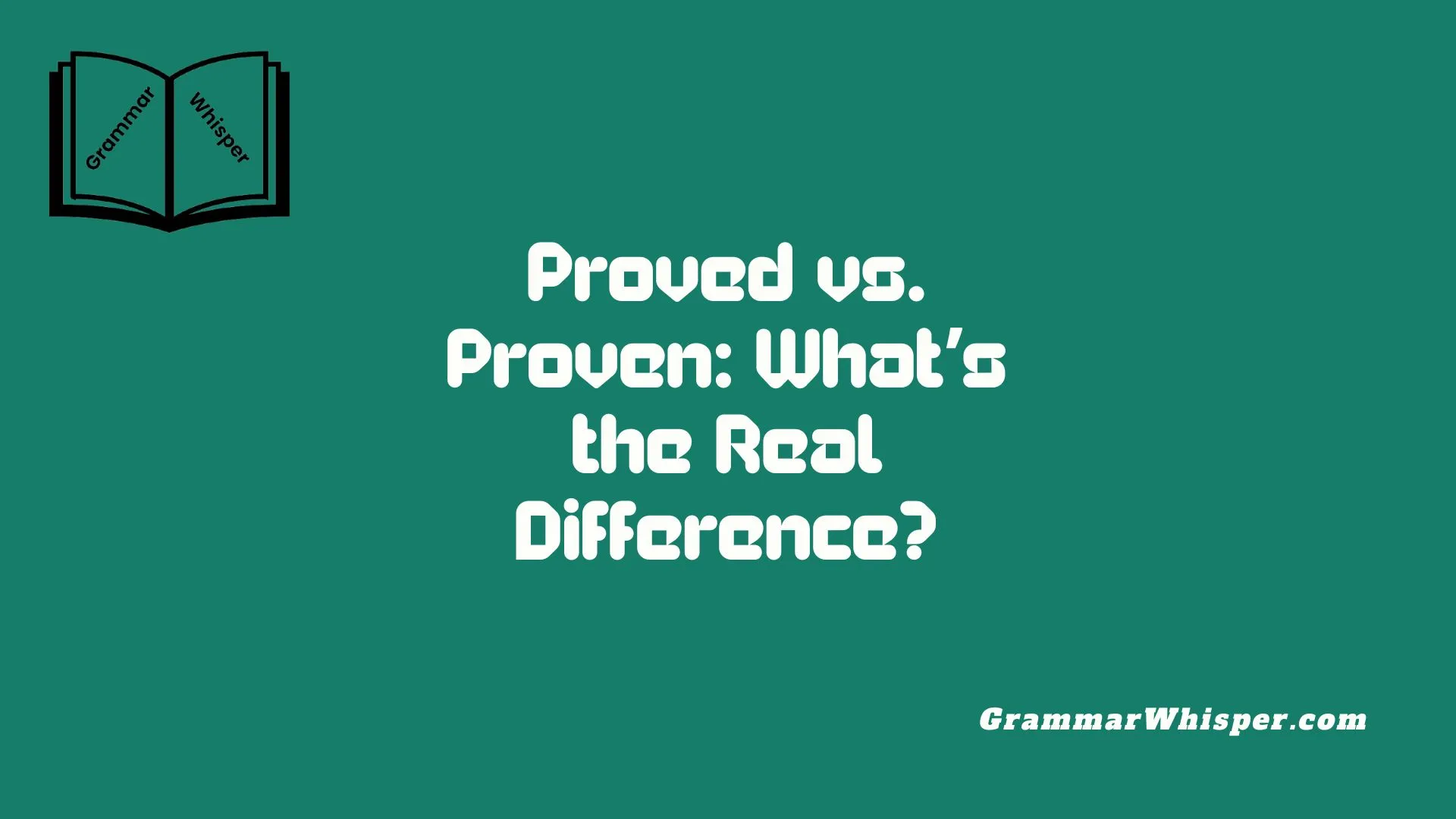As a writer, I’ve been in that familiar spot – staring at a sentence, hovering between proved vs. proven, unsure which word fits best. This small choice often sparks unexpected confusion in the language. Both are past participles of “prove,” yet they aren’t always interchangeable. In American English, modern grammar tends to favor proved for formal usage, while proven commonly pops up when used as an adjective, like in the phrase “a proven method.” These slight differences reflect how tricky grammatical rules can be for a new student or experienced editor alike.
This debate has a deep historical thread woven through evolving language changes and subtle shifts in preference. I recall opening a doc in Microsoft Word, only to find the notorious red underlines glaring under “proven.” That moment sparked a deeper dive into this grammar puzzle. Over time, I compiled a helpful guide to navigate such choices, especially when aiming for a more academic tone or a polished final draft. Getting the nuance between “proved” and “proven” right doesn’t just satisfy the rules – it elevates your writing.
Why the ‘Proved’ vs. ‘Proven’ Debate Still Matters
Let’s cut to the chase: clarity and precision matter.
Imagine you’re submitting an academic thesis or writing legal documentation. Using the wrong past participle can cost you credibility. And in marketing or business writing, word choice directly influences trust.
The confusion usually boils down to this:
- “Proved” is the traditional past participle of “prove”.
- “Proven” emerged later and is often preferred in American English, especially as an adjective.
But it’s not just a matter of tradition – it’s about usage, tone, and even geography.
The Core Distinction Between ‘Proved’ and ‘Proven’
At the heart of the debate is grammar.
| Verb Form | Example Sentence | Notes |
| Proved (past tense) | She proved her theory correct. | Standard past form |
| Proved (past participle) | He has proved his innocence. | Traditional participle |
| Proven (past participle) | The technology has proven effective. | Accepted, especially in the US |
| Proven (adjective) | A proven strategy is essential. | Only “proven” works here |
In short:
- You can use either “proved” or “proven” as the past participle of “prove.”
- But only “proven” functions as an adjective (e.g., “a proven leader”).
A Brief but Precise History of ‘Proved’ and ‘Proven’
English grammar didn’t just fall from the sky – it evolved.
The verb “prove” entered English via Old French prover, which in turn came from Latin probare, meaning to test or demonstrate.
Historically:
- “Proved” was the only past participle form used for centuries.
- “Proven” appeared in the 16th century, largely in Scottish English, and gained traction in legal and scientific contexts.
Interestingly, Shakespeare never used “proven.” He stuck with “proved.” So did the King James Bible. The tide didn’t begin to shift until much later – especially across the Atlantic.
‘Proved’ in Literature: From Shakespeare to Scientific Journals
Classic and academic literature overwhelmingly favors “proved.”
“What can be proved by logic is always trivial.” – Ludwig Wittgenstein
Literary and Academic Usage
- Shakespeare (1600s): “I have proved thy virtue.”
- Sir Isaac Newton: “It is easily proved…”
- Modern scientific papers still use proved when citing formal results or theorems.
Why it matters:
In academic circles, “proved” carries a more formal, rigorous tone – especially in disciplines like mathematics, logic, philosophy, and scientific publishing.
The Rise of ‘Proven’: Law, Journalism, and Everyday English
Now let’s talk about why “proven” exploded in usage.
Legal Influence
In courtroom language, “proven” sounds more emphatic and decisive. For example:
“Innocent until proven guilty.”
This phrase, heavily repeated in American law and media, helped “proven” seep into mainstream usage.
Media and Marketing
Marketing teams love the certainty that “proven” brings:
- “Proven results in 30 days!”
- “A proven solution for back pain”
- “Proven strategies for business growth”
It’s punchier. It sounds more confident. It sells.
Grammar Rules Explained: When to Use ‘Proved’ vs. ‘Proven’
Let’s untangle the grammar.
Past Tense
Use proved only.
✅ Correct:
- She proved her point.
- He proved his loyalty.
🚫 Incorrect:
- She proven her point.
Past Participle
Both are grammatically correct, but context matters.
✅ Both are acceptable:
- He has proved himself.
- He has proven himself.
But in formal, especially academic, writing – “proved” is often safer.
Adjective
Only proven is allowed.
✅ Correct:
- A proven technique
- The proven leader of the team
🚫 Incorrect:
- A proved technique
‘Proven’ as an Adjective: The Game-Changer
This is where “proven” shines.
“Proven” is now deeply embedded in adjectival use – especially in:
- Business writing: “A proven revenue model”
- Marketing: “Clinically proven results”
- Leadership and HR: “A proven track record”
Think of it as a status marker. Something tested. Something certified.
🔎 You’ll never see “proved” used as an adjective. It just doesn’t work. For example:
- ❌ “A proved formula”
- ✅ “A proven formula”
Regional Usage: British vs. American Preferences
This is where style guides diverge.
| Region | Preferred Form | Notes |
| British English | Proved | Used in both past and participle forms |
| American English | Proven | Increasingly common as participle and adjective |
Style Guide Preferences
- Oxford English Dictionary: Proved preferred, but accepts proven
- The Guardian (UK): Uses “proved” as past participle
- Associated Press (US): Accepts “proven,” especially in headlines
Even Google’s Ngram Viewer shows “proven” outpacing “proved” in American publications since the 1980s.
Real-World Usage: What the Data Says
Let’s go data-driven.
According to the Corpus of Contemporary American English (COCA) and Google Books Ngram Viewer:
- “Proven” appears roughly 2.5x more often in modern American publications than “proved.”
- In British sources, “proved” still maintains a slight edge.
Top Phrases Indexed
| Phrase | Frequency (US) | Frequency (UK) |
| Proven track record | High | Moderate |
| Proven results | High | Low |
| Has proved to be | Moderate | High |
Common Mistakes and Misconceptions
Even seasoned writers get this wrong. Let’s clear up the most frequent errors:
Mistake: Using “proven” in past tense
❌ “She proven her dedication.” ✅ “She proved her dedication.”
Mistake: Using “proved” as an adjective
❌ “A proved technique” ✅ “A proven technique”
Misconception: “Proven” is always better
Not in academic, scientific, or technical writing. In those circles, “proved” signals rigor and tradition.
Making the Right Choice in Your Writing
So, when should you use “proved” and when should you go with “proven”?
Here’s a quick-reference guide:
Use “Proved” When:
- You need to stick to formal grammar
- Writing for academia, science, or technical audiences
- You’re using the simple past: She proved her point.
Use “Proven” When:
- You’re writing for marketing, media, or casual tone
- You need an adjective: proven strategy, proven leader
- You want to add punch and certainty in American English
Summary Table: ‘Proved’ vs. ‘Proven’ at a Glance
| Usage Type | Proved | Proven |
| Simple past tense | ✔️ | ❌ |
| Past participle | ✔️ | ✔️ |
| Adjective | ❌ | ✔️ |
| Common in UK English | ✔️ | ✔️ (less often) |
| Common in US English | ✔️ (less often) | ✔️ |
| Formal/academic style | ✔️ | ❌ |
| Marketing/media tone | ❌ | ✔️ |
Final Thoughts
So, proved vs. proven – which is correct? The answer lies in usage, tone, and purpose.
Both forms are grammatically acceptable as past participles of the verb “prove.” However, their application varies. “Proved” is the older, more traditional form, widely used in formal, academic, and British English contexts. “Proven,” on the other hand, is more modern and widely accepted in American English, especially when functioning as an adjective – like in phrases such as “proven results” or “proven leader.”
Understanding the difference between these two forms empowers you to write with precision. If your writing leans toward formality or follows UK style guides, “proved” is generally the safer bet. If you’re aiming for a confident, persuasive, or marketing tone – particularly in the U.S. – “proven” may be the stronger choice.
FAQs
Proved vs. Proven – Which Is Correct in Academic Writing?
In academic writing, “proved” is typically the preferred form. It’s more traditional and aligns with formal grammar rules and academic tone. While “proven” is acceptable, especially in the U.S., many scholarly journals and research institutions still favor “proved” for its precision and formality.
Proved vs. Proven – Which Is Correct as an Adjective?
When used as an adjective, “proven” is the only correct choice. You might say “a proven formula” or “a proven track record.” Using “proved” in this context would sound awkward and be grammatically incorrect. The adjectival role firmly belongs to “proven” in modern English.
Proved vs. Proven – Which Is Correct in Legal Documents?
Legal writing in the United States often favors “proven,” especially in set expressions like “innocent until proven guilty.” However, British legal systems may still use “proved” in formal documents. Context and regional preference play a key role in determining which form is correct in legal language.
Proved vs. Proven – Which Is Correct in Marketing?
In marketing and advertising, “proven” dominates. It conveys authority, trust, and effectiveness. Phrases like “proven results,” “proven methods,” and “clinically proven” resonate more with consumers than the alternative. It’s punchier, more persuasive, and better suited for promotional tone.
Proved vs. Proven – Which Is Correct in American vs. British English?
American English commonly uses both “proved” and “proven,” with “proven” gaining an edge in everyday speech and writing. British English, however, tends to favor “proved,” especially in formal or academic contexts. Despite this, “proven” is becoming more widely accepted globally, particularly in media and business environments.











